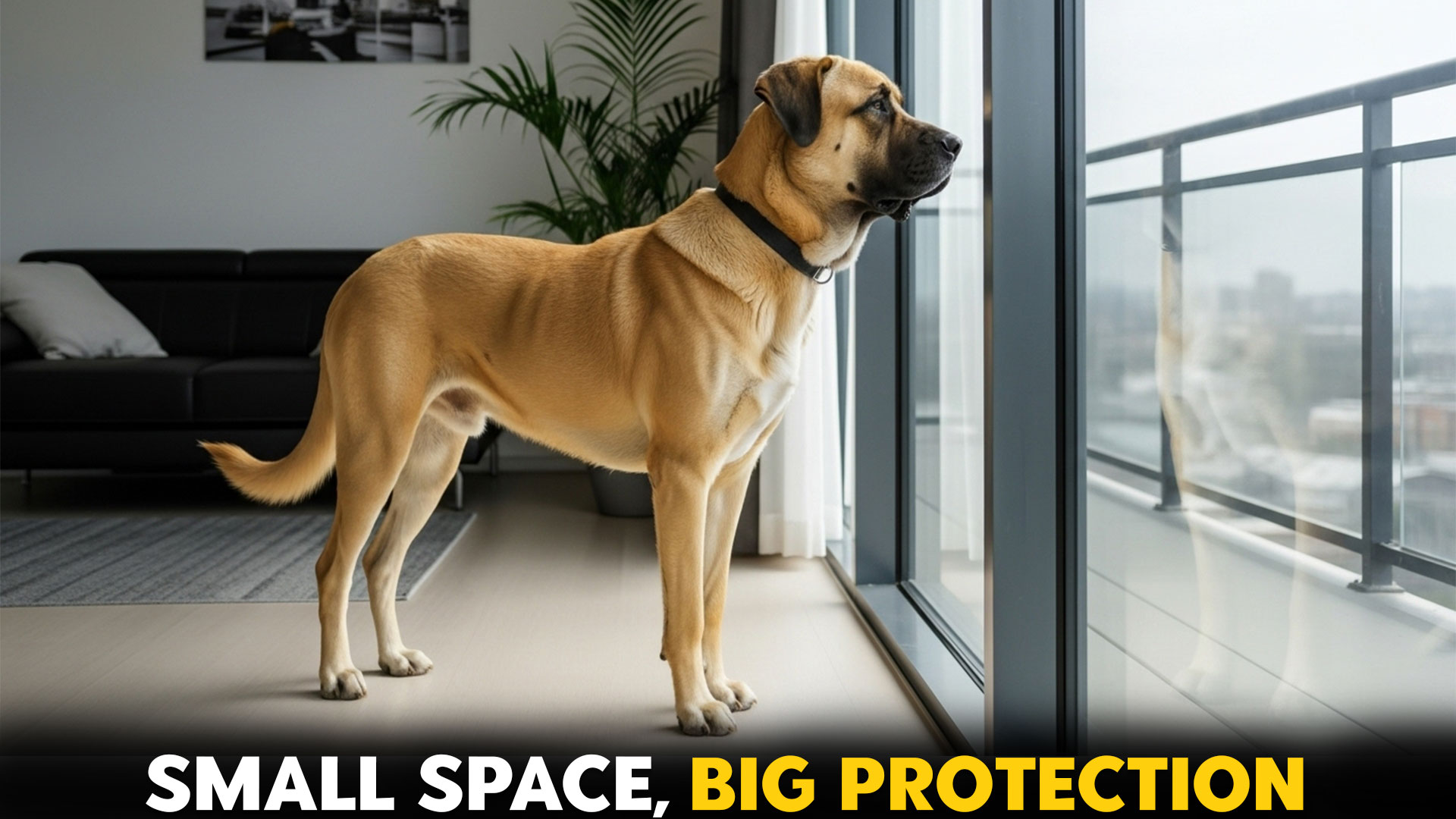If you live alone, safety and companionship often go hand in hand—and that’s where dogs step in. Their presence alone can bring peace of mind, especially during quiet nights when the smallest sounds can feel unsettling.
For single women or anyone living by themselves, a loyal canine can be both a comforting companion and a silent protector.
What makes dogs excellent guardians is not just their bark or bite, but their loyalty, intelligence, and watchful instincts.
A well-trained dog doesn’t just scare off intruders—it learns to sense the difference between real threats and harmless situations. This balance ensures that your protector is also a gentle family member who is keenly alert to protect you in any situation.
And here’s the best part: you don’t need a big yard to have a reliable guard dog. Many dog breeds thrive in apartments and small homes, proving that even dogs living in compact spaces can bring courage, protection, and endless love right to your doorstep.
From powerful protectors to vigilant watchdogs, a secure home is just a dog away.
Best Guard Dog Breeds for People Without a Yard
1. Anatolian Shepherd Dog
History & Traits
With roots tracing back more than 6,000 years to the Bronze Age, the Anatolian Shepherd Dog is one of the oldest guardian breeds in the world, according to WebMD.
Originally bred in Turkey as a livestock guardian dog breed from wolves and other predators, these dogs are known for their strength, independence, and fearless loyalty. Muscular yet agile, they are calm with their families but alert and unyielding when facing a threat.
This long legacy of guardianship makes them deeply instinctual protectors even in modern households.
Why They’re Good Guard Dogs
Territorial and loyal, always alert to protect home and family
Independent thinkers capable of assessing threats on their own
Deep, commanding bark that deters intruders instantly
Protective of children, smaller pets, and property alike
Apartment Living Without a Yard
Although they’re a large and powerful breed, Anatolians don’t require constant running space. With proper daily walks, structured routines, and mental stimulation, they can adapt to smaller homes or apartments.
However, families should be mindful of their barking, as they may vocalize when sensing unusual activity—a challenge in close living quarters.
2. Appenzeller Sennenhund
Breed Background & Heritage
The Appenzeller Sennenhund, also called the Appenzeller Mountain Dog, hails from Switzerland and is one of the four traditional Sennenhund breeds.
Recognized for its tri-color coat and square, muscular build, this medium-sized dog breed was originally bred for herding and guarding livestock in mountainous regions. Officially standardized in 1914, the breed remains rare but is admired for its intelligence, reliability, and high-spirited energy.
What Makes Them Strong Protectors
Naturally suspicious of strangers, making them excellent watchdogs
Fearless yet reliable protectors who won’t be easily bribed
Highly intelligent and quick to learn protective commands
Strong territorial instincts that make them loyal defenders of home and family
Adapting to Apartment Living
While the Appenzeller is adaptable in many ways, apartment living can be tricky due to their high energy levels and need for space.
However, with a dedicated owner who provides long daily walks, vigorous play, and mentally stimulating tasks, they can adjust to smaller homes. Their alertness and strong guarding instincts mean they’ll still provide excellent protection even in compact living spaces.
3. Barbado da Terceira
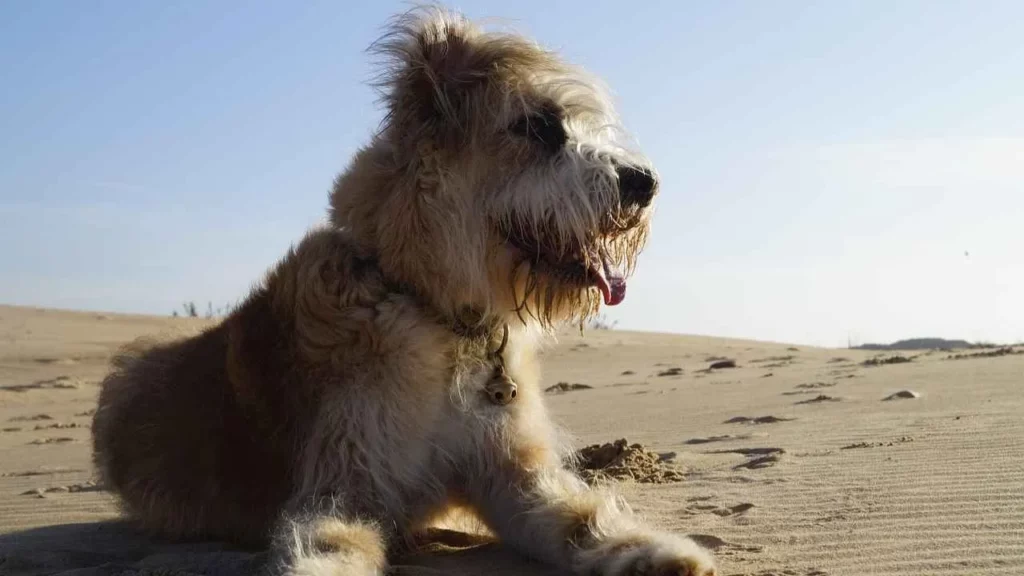
Heritage & Background
The Barbado da Terceira (BDT) originates from the Azores, specifically Terceira Island in Portugal, where it was bred as a hardy cattle and livestock herder, as noted by the AKC.
This medium-sized breed is athletic, intelligent, and deeply devoted to its family. With a strong working spirit and striking appearance, the BDT thrives when given both purpose and companionship, making it a loyal and rewarding guardian.
Why They Excel as Guard Dogs
Naturally loyal and watchful of family and territory
Assertive around other dogs, yet gentle with loved ones
Quick learners who respond well to protective training
Adaptable instincts that balance guarding with family-friendly behavior
Temperament & Character
Joyful, sensitive, and devoted, the BDT is an affectionate dog breed with a touch of independence. They bond strongly with their owners and are happiest when included in everyday life.
Protective yet not overly aggressive, their balance of loyalty and gentleness makes them both trustworthy guardians and loving pets.
4. Bullmastiff
Roots & Background
The Bullmastiff was originally developed in 19th-century England as a gamekeeper’s guardian to ward off poachers.
PetMD mentions that this is a mix between the English Mastiff and the Bulldog; the breed combines the strength of one and the determination of the other. Today, Bullmastiffs remain true to that legacy—loyal, protective, and gentle giants with an instinct for safeguarding their families.
Guarding Qualities
Naturally protective and territorial without being overly aggressive
Quiet watchdogs—bark sparingly but with purpose
Strong, imposing presence that deters intruders
Loyal guardians of children and family pets
Thriving in Smaller Homes
Despite their large size, Bullmastiffs adapt surprisingly well to apartment and small-home living because they are relatively low-energy indoors.
These large dogs enjoy short bursts of play and structured walks rather than constant running. Their calm demeanor, paired with minimal barking, makes them suitable for urban living—though space for stretching out is always appreciated.
5. Central Asian Shepherd Dog
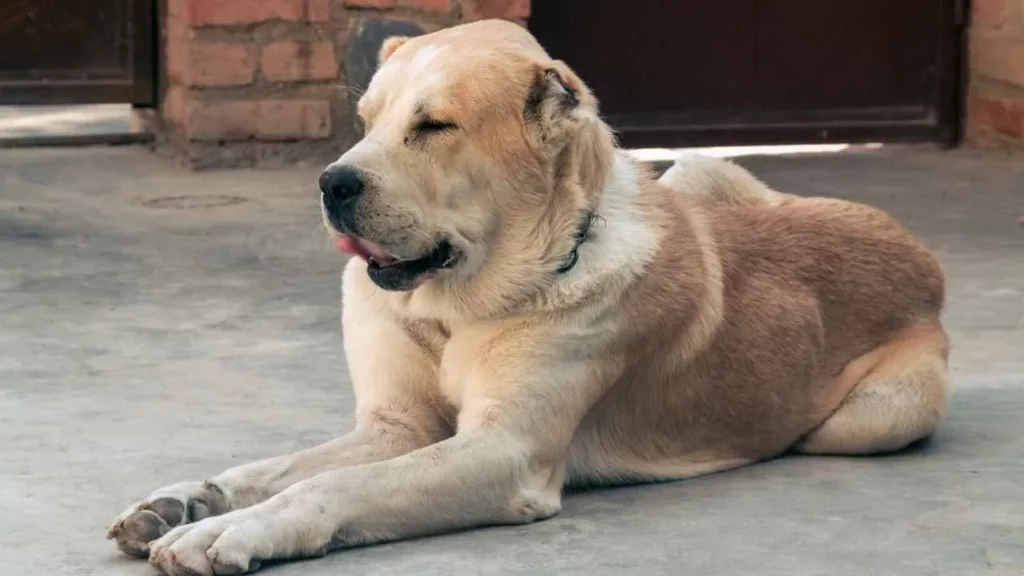
Breed Heritage & Origins
The Central Asian Shepherd Dog, also known as the Alabai, is one of the oldest natural guard dog breeds in existence.
Originating from regions spanning Central Asia, they were bred to protect livestock and property against wolves, bears, and intruders. With thousands of years of survival-driven breeding, this dog embodies strength, endurance, and loyalty.
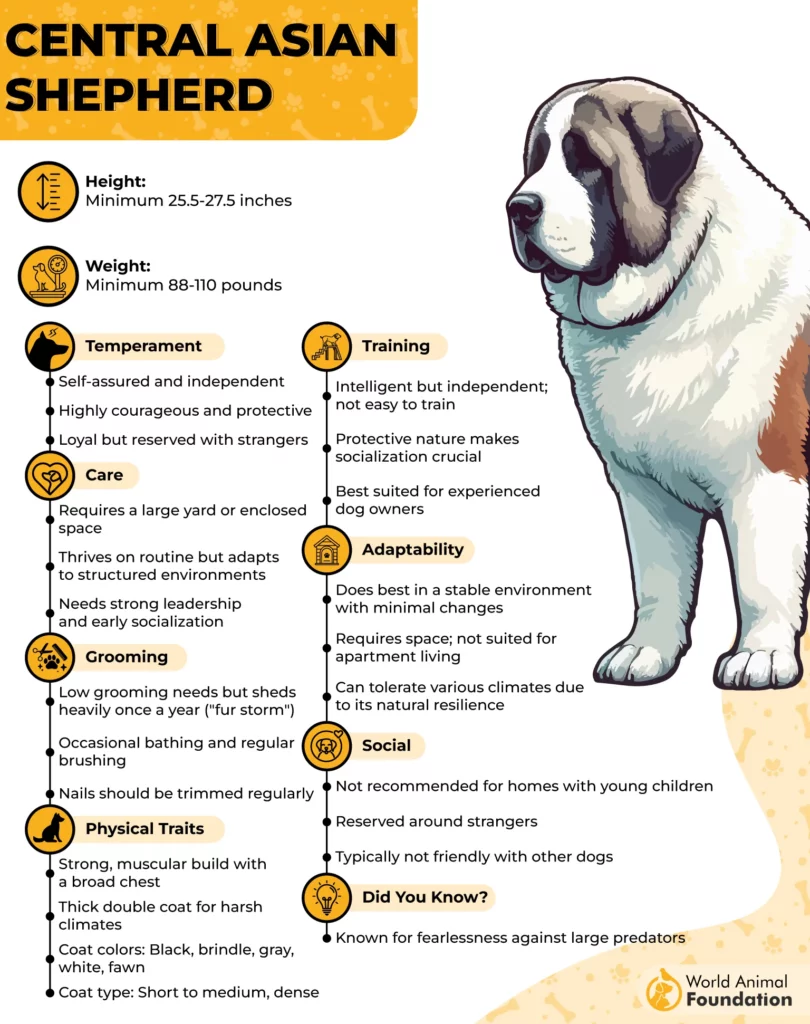
Guarding Strengths
Natural guardians with powerful territorial instincts
Courageous and calm under pressure
Deep, authoritative bark that deters unwanted visitors
Protective of children and devoted to their families
Living in Smaller Homes
Although massive in stature, Central Asian Shepherds are surprisingly low-energy indoors. They enjoy calm, relaxed home environments and are not overly restless.
With daily walks and structured outdoor time, they can adapt to apartment living. Their protective instincts make them reliable guardians even in confined spaces, though their size requires room to stretch and lie comfortably.
6. German Shepherd Dog
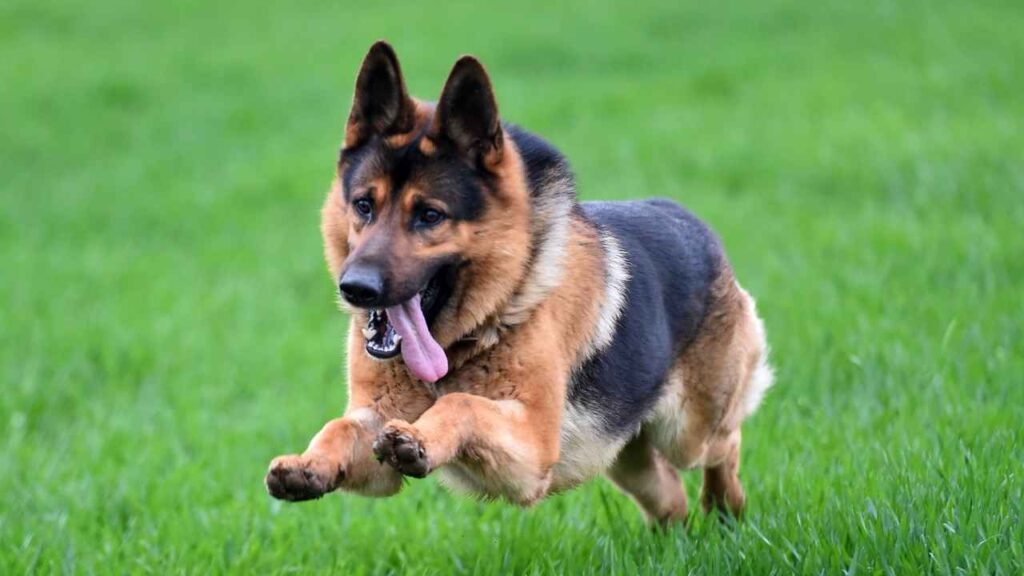
History & Lineage
Admired for their intelligence, courage, and versatility, they’ve served in roles ranging from police and military work to loyal family companions. The German Shepherd is one of the world’s most recognized breeds, according to PDSA.
They were originally developed in Germany in the late 19th century as a working and herding dog breed. Their reputation as protectors comes from a blend of instincts and trainability, making them one of the best guard dogs for families.
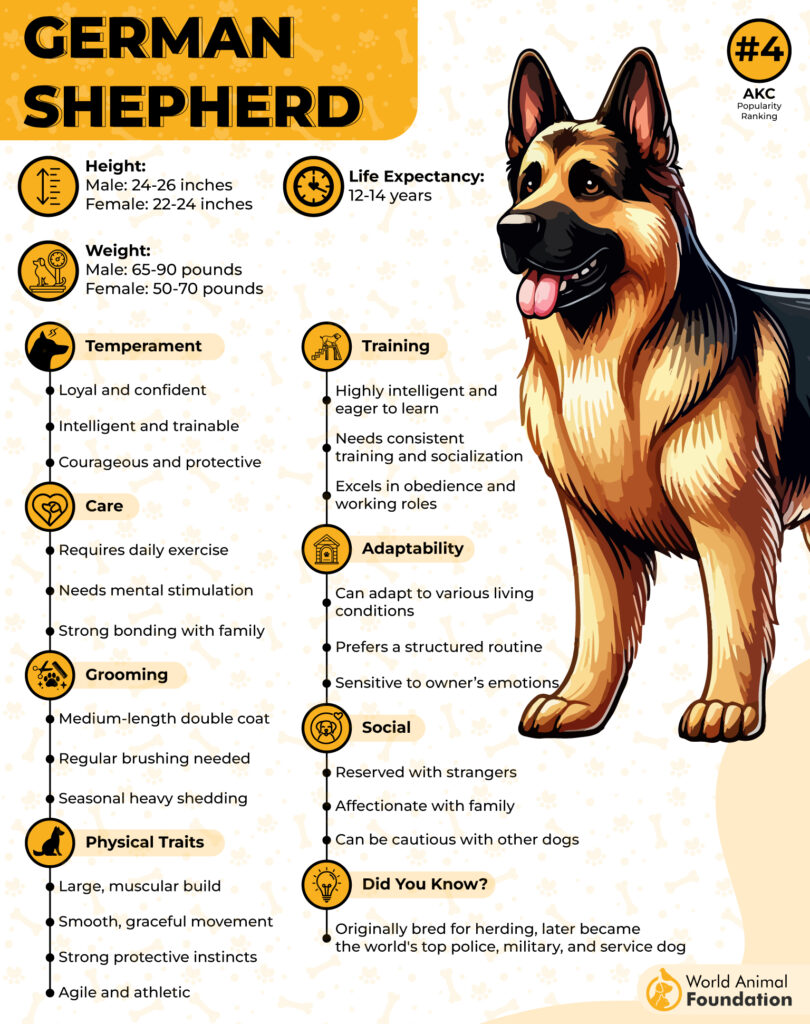
Why They’re Trusted Protectors
Naturally loyal and devoted to their families
Intelligent and quick to learn complex commands
Alert watchdogs with a sharp sense of awareness
Courageous and willing to act when danger arises
Personality & Household Fit
German Shepherds are confident, protective, and deeply loyal.
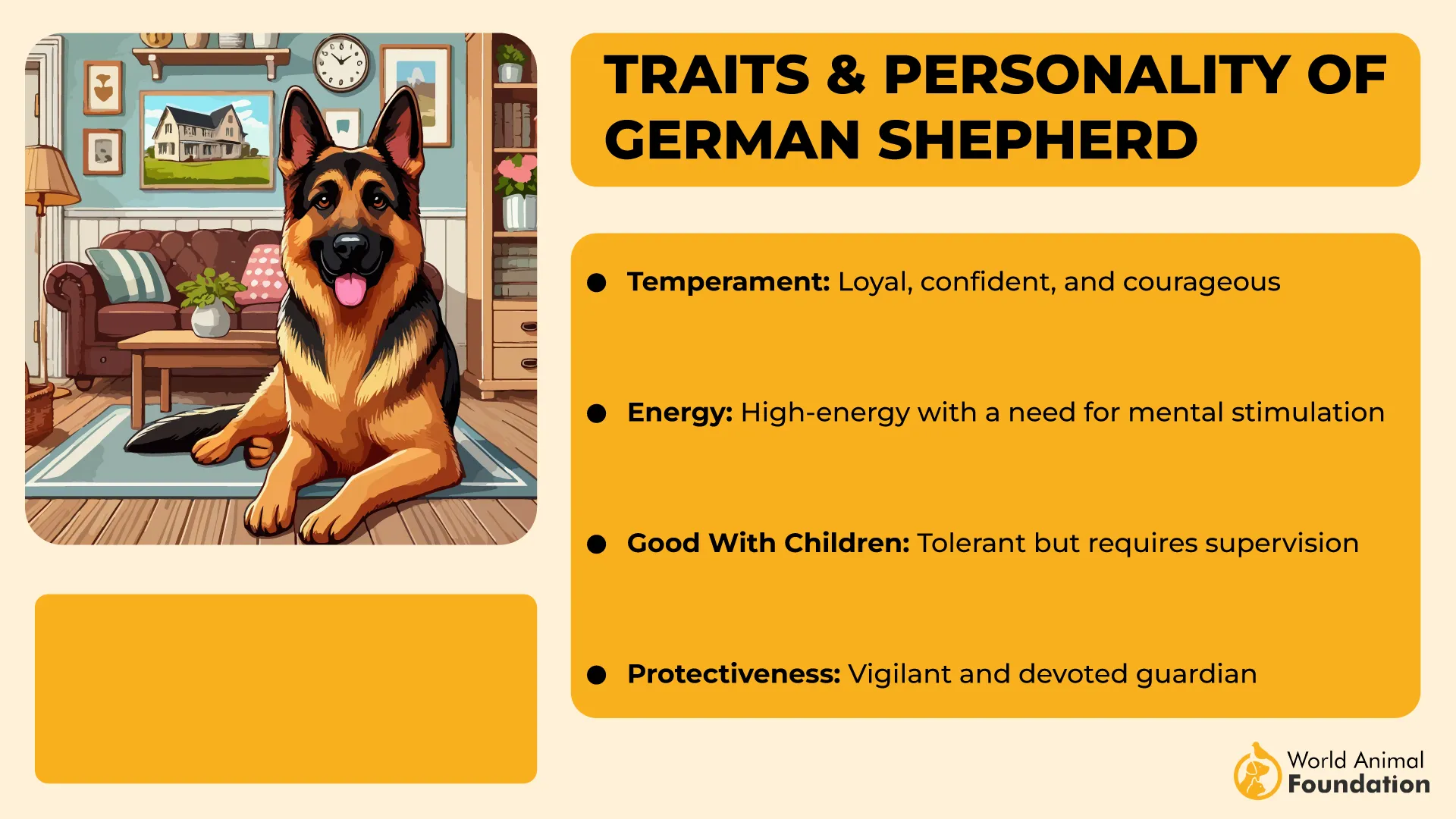
With family, they are affectionate and playful, often bonding especially closely with one person. Around strangers, they remain cautious until properly introduced, which strengthens their role as reliable watchdogs. Their balance of warmth and vigilance makes them a great family dog.
7. Doberman Pinscher
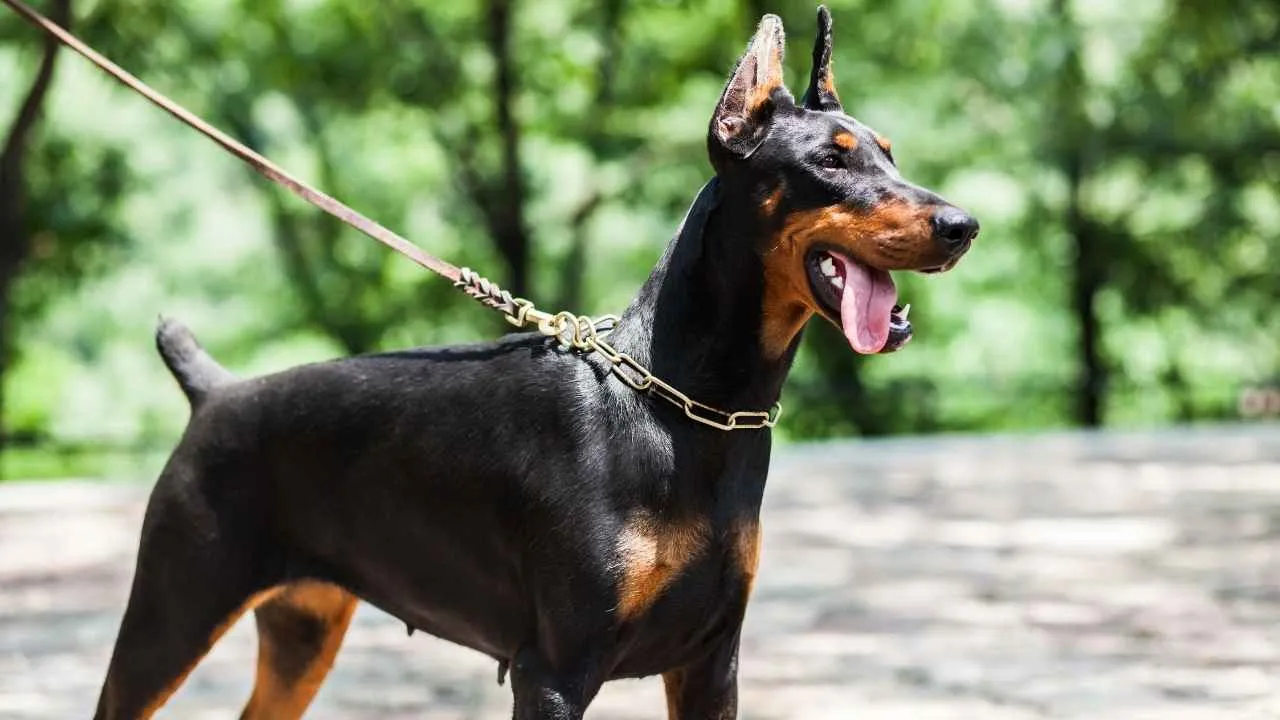
History & Origins
The Doberman Pinscher was developed in late 19th-century Germany by Karl Friedrich Louis Dobermann, a tax collector who wanted a loyal, protective, and smart dog breed by his side.
Bred from a mix of Rottweilers, German Pinschers, and Greyhounds, the Doberman quickly gained a reputation for speed, alertness, and bravery, according to Britannica. Today, they remain one of the most iconic guard dog breeds, admired worldwide for their elegance and unwavering loyalty.
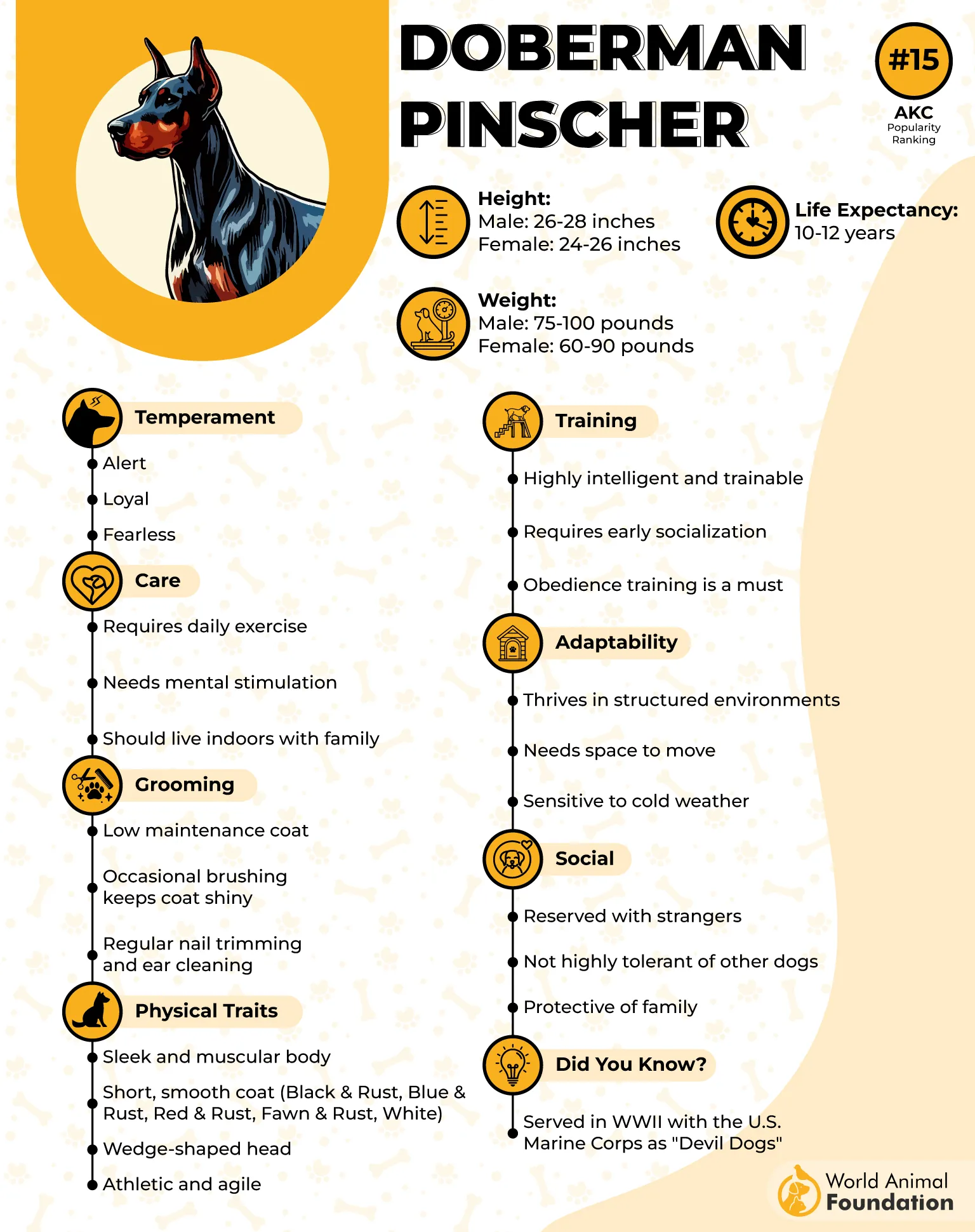
Why They’re Outstanding Protectors
Fearless and highly alert in any environment
Loyal and affectionate toward their families
Naturally athletic with strong guarding instincts
Known for their intelligence and quick decision-making
Apartment & City Living
While Dobermans thrive with room to run, they can also adapt well to apartment living if their energy needs are properly met.
They require daily exercise and mental stimulation, such as long walks, training games, or agility exercises. Without activity, they may become restless or destructive, but in an engaged household, they flourish in both small and large living spaces.
Conclusion
Choosing the best guard dog breeds for people without a yard depends on balancing protection with adaptability.
Many guard dog breeds like the Doberman Pinscher, German Shepherd, and many more have the intelligence, courage, and natural protective instincts to be excellent protection dogs even in smaller spaces.
With proper training and early socialization, these breeds can adapt to family life, offer companionship, and still serve as reliable protectors in threatening situations.
While some ancient breeds, such as the Tibetan Mastiff, Rottweiler, and Cane Corso, are known for their imposing size and protective nature, others like the Staffordshire Bull Terrier, Bull Terrier, and Australian Shepherd combine loyalty and energy with adaptability.
These protective dog breeds not only deter intruders with their watchful courage but also make affectionate family members who enjoy play, exercise, and attention.
In the end, the best guard dogs are those that strike a balance between being a loyal guardian and a great family pet. Whether it’s a big dog bred to protect livestock or a naturally affectionate breed with a loud bark, the key factors are always training and proper socialization, enough space, and the commitment of responsible dog owners.
With these in place, any of the formidable protectors highlighted can thrive as deeply loyal companions, ensuring the safety of loved ones while enriching family life with joy, courage, and unwavering loyalty.


